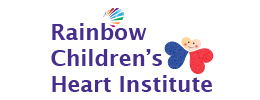Acquired heart disease is a heart defect or problem that children acquire after a childhood illness. This differs from congenital heart defects, which are heart problems that children are born with. There are four main types of pediatric acquired heart diseases treated at child heart hospital:
- Kawasaki disease: It is an illness that mainly affects young children and may leave coronary arteries or heart muscle damaged.
- Myocarditis: It causes inflammation or damage to the heart muscle due to a viral infection.
- Cardiomyopathy: This heart muscle disease is caused after an infection or due to a genetic disorder. It causes the heart to function poorly.
- Rheumatic heart disease: This illness causes damage to the heart valve and muscle, and it is caused due to rheumatic fever.
Kawasaki disease
Typically, Kawasaki disease affects children below the age of 5 years. The cause of the disease is unknown but it is likely to be caused due to an abnormal reaction to common germ. The disease may damage the coronary arteries or heart muscle. While it is not contagious, it may occur in clusters.
The primary symptom of the disease is a persistent fever that lasts for more than 4 days. Usually, the fever does not have an obvious explanation and it doesn’t respond to paracetamol. Additionally, small blood vessels may be inflamed, which may cause the following symptoms:
- Swollen, cracked, and red lips
- A rash that may appear in the groin region
- Red eyes
- Swollen feet and hands
- Swollen and bright red tongue
- Swollen lymph nodes
- Red rash on soles of feet and palms of the hand
There is no specific test for diagnosing Kawasaki disease. The doctor may diagnose by excluding other probable causes and using echocardiogram and blood tests for examining the heart. Intravenous immunoglobulin from donated blood transfusions is used for treating Kawasaki disease.
Myocarditis
Myocarditis occurs when the heart muscle gets inflamed. Normally, the immune system is capable of responding to invading organisms. However, in some cases, the immune system may act too aggressively, thus destroying foreign organisms as well as heart muscle cells. Due to this immune system response, the heart muscle can swell and thicken. The heart muscle cells that are damaged may eventually heal and form scar tissue. If a considerable portion of the heart is affected, it may impair the ability of the heart to pump blood. Pediatric Cardiac Surgeons at Rainbow Children’s heart Institute in Hyderabad will help you know more about it.
Myocarditis may be triggered by chemicals, medications, and autoimmune diseases. In most cases, however, an infection triggers myocarditis. The following may cause the infection:
- Glandular fever
- Influenza (flu)
- Rubella
- Rheumatic fever
- Diphtheria.
- HIV
There might not be any obvious symptoms of myocarditis. Even when symptoms do occur, they might not be detected easily. Symptoms may include poor blood circulation, skin discoloration, reduced urine production, fever, swelling in the feet, legs, or face, and chest palpitations and pain. Following are the common diagnostic tests performed by the best pediatric cardiac surgeonat Rainbow Children’s Heart Instituteto confirm myocarditis:
- Chest X-rays
- Heart ultrasound or echocardiogram
- Electrocardiogram
- Blood tests for assessing liver and kidney function
- Heart biopsy
Many children completely recover from myocarditis, while some end up developing major heart failure. The condition itself does not have any cure. Treating myocarditis involves treating the underlying cause and facilitating proper heart function.
Cardiomyopathy
Cardiomyopathy is a heart muscle disease that has three main types:
- Hypertrophic cardiomyopathy: The heart muscle thickens
- Dilated cardiomyopathy: One or more of the chambers in the heart enlarge
- Restrictive cardiomyopathy: Increased rigidity of the heart muscle
The cause remains unknown in most case, but certain factors may have a role to play, including:
- Heart valve problems
- A family history of the disease
- Genetic disorders
- Viral infections
Symptoms of the conditions tend to vary and it includes:
- Swelling of the abdomen with fluid
- Swelling of the hands and feet
- Fatigue
- Breathlessness
- Irregular heart rhythm
- light-headedness, fainting, and dizziness while performing physical activity.
Treatment of cardiomyopathy depends on the type and it may include medications, devices such as a pacemaker, and even surgery or a heart transplant.
Rheumatic heart disease
Acute rheumatic fever can cause rheumatic heart disease, which may damage the heart valves or muscles for the long term, particularly with repeated episodes that are left untreated. Treatment for acute rheumatic fever involves medications, usually antibiotics.
